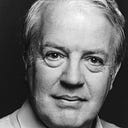James Dale
The Wimbledon season takes me back to other summers, and especially to the men’s final in 1982 between Connors and McEnroe, which I watched at Denville Hall with my old friend the actor James Dale. He was very excited by the tennis and didn’t seem to be suffering as I was from the warmth of the TV room, over-heated so far as I was concerned for the retirement home’s elderly residents!
If Jimmie’s name is remembered now it is probably for his genial performance as Dr Dale — husband of Mrs Dale the Diarist — for nine years, on radio. The actor’s name, extraordinarily, being the same as the character’s. I met Jimmie when we both lived in Hampstead, and for years we had a regular Saturday lunchtime date for a few pints, if I was in London.
Jimmie Dale was a wonderful talker with an amazing memory, not just for his own career as an actor (and painter) but over a wide range of subjects. When you went to his home, his many portraits made a vivid impression for their clear and realistic style and their skilled likenesses. There was a splendid one of his wife Maggie — to whom he was happily married for seventy years until her death in 1981 — and portraits of his mother, his daughter (the novelist Celia Dale), and his grandson Simon. Then there were the pencil drawings, humorous and unmistakable — such as those of Robert Atkins and David Tomlinson which I now own. Looking at photos of Jimmie in classical parts, it is obvious that he brought the same sort of clear, firm line to his stage portrayals.
He was no snob about acting — though he was the most complete arts intellectual I have known. He was a member of the BBC Drama Repertory Company when the original Dr Dale, Douglas Burbidge (with whom he had appeared on Broadway in Flecker’s “Hassan”), gave up the part with whom he shared a name. Jimmie told me that the producer Norman Wright suggested him, but in retrospect the takeover seemed inevitable.
He was never — though he could be abrasive about things he found tiresome — scathing about the Dales, which he approved of as well-written popular entertainment. He spoke fondly of Ellis Powell who played Mrs Dale. But it was perhaps an incongruous ‘retirement job’ for an actor who proudly described himself as Bernard Shaw’s favourite Malvolio in “Twelfth Night”, whose career began in 1908 and continued (on radio) into the Seventies. He was born in 1886; he began as a portrait painter and went into the theatre with Frank Benson’s touring Shakespearean companies. As well as acting and painting, he was a performed playwright whose “Wild Justice” was a big success in London, and was both filmed and televised. (The play featured an early appearance by Margaret Rutherford.) He was an officer in the First World War, fighting — as he had acted — alongside his friend Basil Rathbone.
After the War he worked at Stratford-on-Avon, was the original Hector Hushabye in Shaw’s “Heartbreak House” and was in films, silent and later talking. Then years of crossing the Atlantic, when he made a Broadway name. In 1933 he played the “older man” in the Broadway production of “The Green Bay Tree”, an example of those early gay plays which never defined their subject matter. Laurence Olivier played the younger man, and Olivier’s wife Jill Esmond the young woman. (Olivier had understudied Jimmie in London in “The Marvellous History of St Bernard” in 1926.)
When the Second World War broke out, Jimmie was back at Stratford-on-Avon. He worked for the Air Force for a time, then did a first spell on the BBC ‘Rep’. He again worked with Olivier, who played Henry V for radio, before his film of the play.
Jimmie continued commuting back to Hampstead on the Northern Line through Blitz-threatened nights. After the War, he went on an extraordinary tour of “Julius Caesar” to newly-partitioned Germany, an experience which left a deep impression.
Then more West End work, more broadcasting — and television, including the King of France in “King John”. His last stage acting was in a London season of Shakespeare for Donald Wolfit. His freelance career did not end either when he went into “The Dales” or when he left it — after that, he played Dr Dale in a skit on television with Bernard Braden, and he played the lead on radio in one of his own plays. The latter was produced by R.D. (Reggie) Smith, who was eventually out-ed as having been in the pay of the Soviets. I wish I could see Jimmie’s reaction to that!
I never saw him onstage, and he only saw me once. In those days working seemed to mean going out of London, for me. He took a great interest in my career and in my family. My wife Maggie and I went to see Jimmie and his own Maggie at their home on our wedding day, because by then they were not able to come to the reception.
He had amazing vitality which enabled him to ignore old age for a very long time. He used to shop and care for his Maggie after she became immobilised with arthritis.
I bought him lunch at the King of Bohemia for his ninetieth birthday. I remember him saying that the best shops were in Highgate and he used to walk there from Hampstead, but was starting to find it very tiring!
On my last visit, nine years later, he wanted news of our children, and was rather bored with his own health. “I am as you see me.” He was in very good form, excellent company, and as usual I stayed longer than I had intended. We heard afterwards that he had died during a shave.
